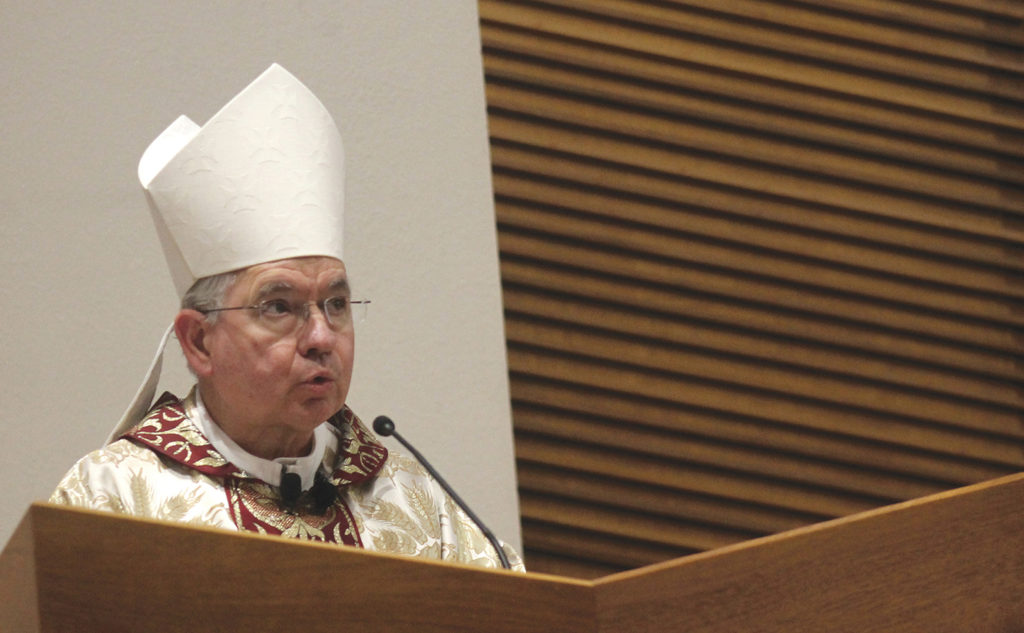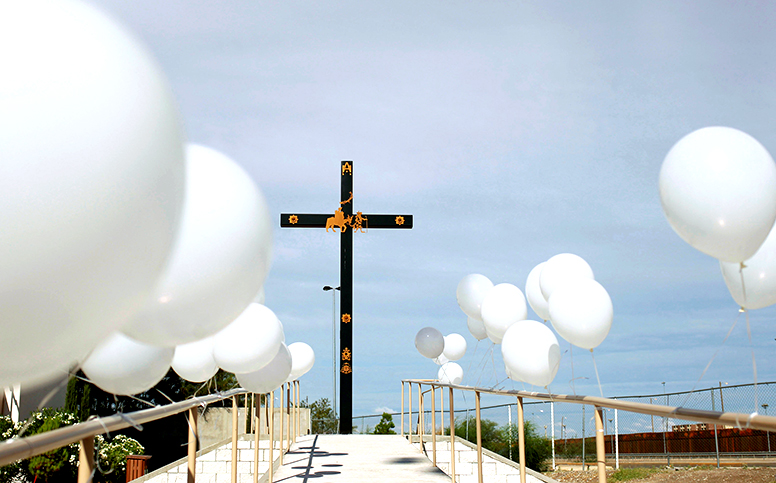
LOS ANGELES (CNS) — Since the mass shootings in California, Texas and Ohio in late July and early August, Los Angeles Archbishop José H. Gómez said he has been praying and reflecting on the tragedies but noted El Paso “hit me in a personal way.”
“My family is Mexican and American, and we trace our roots back to the early 1800s in what is now Texas,” said Archbishop Gómez, who also serves as vice president of the U.S. Conference of Catholic Bishops. “I lived much of my adult life there, including my five years as archbishop of San Antonio.”
“But El Paso is more than personal,” he added. “With El Paso, a line has been crossed in our nation.”
Archbishop Gómez made the comments in an Aug. 13 column in Angelus News, the online media outlet of the Los Angeles Archdiocese.
“In recent years, we have seen the evil of African Americans being targeted in racist terror attacks, notably with the church shooting in Charleston, South Carolina, in 2015,” he said. “With El Paso, for the first time, a massacre has been carried out in the name of stopping Mexican migration.”
The shooter’s rampage at a Walmart in an El Paso shopping center Aug. 3 left 22 people dead and another 26 injured. He reportedly posted a manifesto on a site called 8chan some minutes before his shooting rampage in which he described wanting to end “a Hispanic invasion” in Texas.
In the aftermath, “we are left with some hard questions about what our nation is becoming,” Archbishop Gómez said. “If ‘white nationalism’ is on the rise, it is a sign of how far we have fallen from the Christian universalism of our nation’s founding ideals.”
“In Jesus Christ, there is no Mexican or black, no Vietnamese, Chinese, Korean or Filipino, no Russian or Italian, African or Salvadoran, no migrant or native born,” he continued. “In Jesus Christ, there are only children of God — made in His image, temples of the Holy Spirit, endowed by their Creator with dignity and equality and human rights that must be protected and that no one can violate.
People’s humanity is “never negotiable,” he said, adding that men and women who are “undocumented” are not “less than human” or “less a child of God” because of their status in this country.

But today in the United States, he said, “it has become common to hear migrants talked about and treated as if they are somehow beneath caring about.”
White nationalism and domestic terrorism “are nothing new, sadly,” Archbishop Gómez said, adding that the El Paso killings will take their place alongside “many shameful episodes from our past,” such as “the crackdowns” on Japanese Americans during World War II, “the bombings of churches in the Jim Crow South” and “the lynchings of Mexicans in Texas that continued into the 1920s.”
There is a myth that “America was founded by and for white people,” he said, but the truth is this nation “was born as an encounter of cultures, first with Native Americans. Hispanics arrived in Texas in 1519. Asians started arriving in California about 50 years before the pilgrims made it to Plymouth Rock.”
Spanish was the first non-native language spoken on this continent, “not English,” he noted.
“Successive waves of immigrants from every nation on earth” have renewed this country “again and again,” Archbishop Gómez said.
Phoenix Bishop Thomas J. Olmsted encouraged his followers via Twitter to reflect on Archbishop Gómez’ words.
“Please read and share this thoughtful reflection on the El Paso Shooting by my brother bishop and good friend Archbishop José Gómez,” he wrote in the tweet, which included link to the original column. “Our Lady of Guadalupe, patroness of the Americas, pray for us.”
There is “fear and division” as the nation continues to change, he said, citing the growing number of racial and ethnic minorities in more and more cities, in some cases outnumbering European Americans, like in El Paso and Los Angeles.
“Whites account for less than half of the children being born in America today,” he noted.
The reality today is the world will keep changing, with more and more people around the world seeking a better life in other countries as economic hardship, violence and instability displace them from their homelands, he said.
“The question for us is how will we respond,” Archbishop Gómez said.
“Jesus calls us to find him in the poor and the migrant, the prisoner, the homeless and the sick. He calls us to love others as ourselves, to love others as He loved us,” he explained. “The love we show to those who come to us seeking a new life is the love we show to Christ. He does not make exceptions for only the ‘deserving poor’ or for those with the proper papers.”
“We need to help our society to see our common humanity — that we are all children of God, meant to live together as brothers and sisters, no matter the color of our skin, the language we speak, or the place we were born,” he said.
The archbishop urged Catholics to seek the intercession of Mary in helping “build an America that is still a beacon of hope for peoples of every country, who look to this nation for refuge, for freedom and equality under God.”






